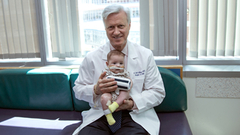Congenital Hyperinsulinism
What is congenital hyperinsulinism (HI)?
Congenital hyperinsulinism (HI) is a genetic disorder in which the insulin cells of the pancreas, called beta cells, secrete too much insulin. Excess insulin causes low blood sugar (hypoglycemia).
Ordinarily, beta cells secrete just enough insulin to keep the blood sugar in the normal range. In children with HI, the secretion of insulin is not properly regulated, causing excess insulin secretion and low blood sugar.
Low blood sugar can be very dangerous, because the brain needs a constant source of sugar. If the brain doesn't get the sugar it needs, it can lead to seizures, brain damage, and possibly death.
Why Choose Us?
The Congenital Hyperinsulinism Center at Children'ss Hospital of Philadelphia is the largest and most active HI center in the world, offering evaluation, diagnosis, treatment, and follow-up care for children with congenital HI.
Congenital HI is a rare disease, affecting 1 in 25,000 to 50,000 babies. Since most children’s hospitals encounter only one or two cases a year, it is important to receive medical care from an experienced treatment center, such as the Congenital Hyperinsulinism Center at Children’s Hospital of Philadelphia (CHOP).
Treatment for congenital hyperinsulinism
Because congenital HI causes dangerously low blood sugars as a result of excess insulin, the treatment for this condition is to try and maintain blood sugars greater than 70 mg/dL. There are two options for treatment of congenital HI, medical therapy and surgical intervention. About 50 percent of children respond to medical therapy, while the other half require surgery for a partial or near total pancreatectomy.
Long-term outcomes
In children with focal hyperinsulinism localization of the lesion using 18FDOPA PET/CT scans prior to surgery allows for precise surgical resection of the lesion, resulting in cure of the hyperinsulinism. Over 90 percent of children with focal hyperinsulinism evaluated and treated at our center have been cured.




